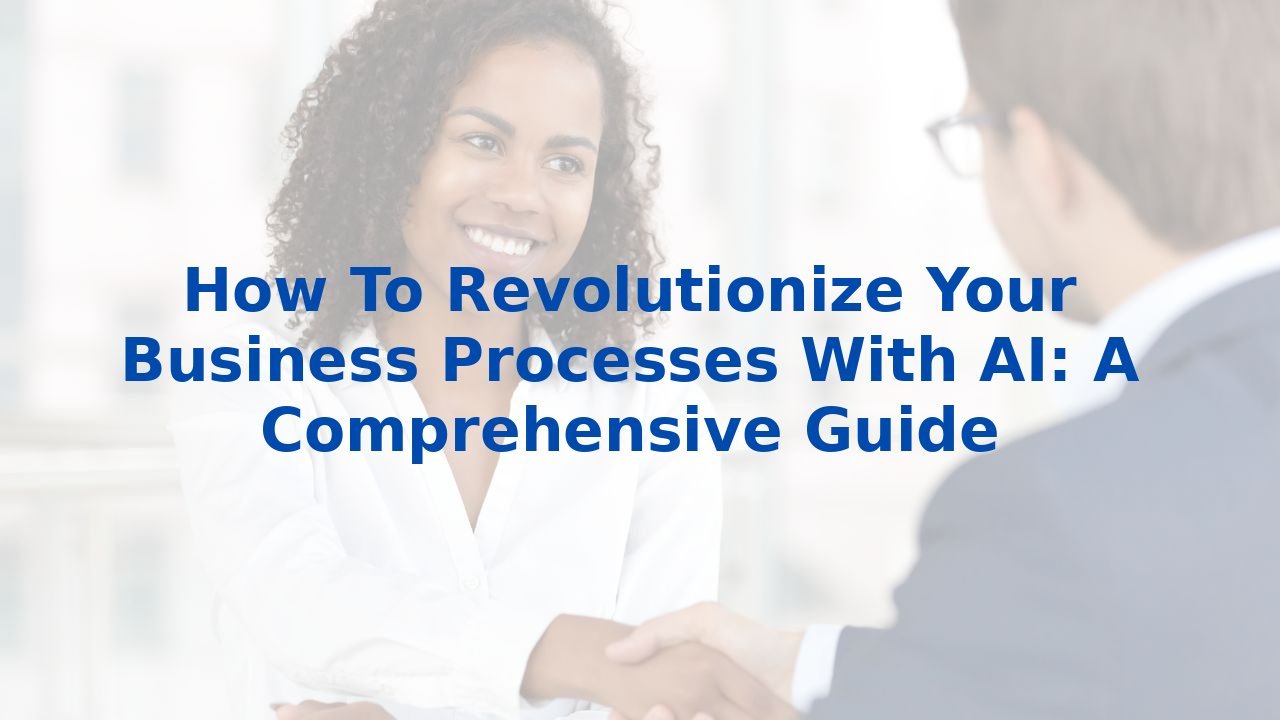How to Revolutionize Your Business Processes with AI: A Comprehensive Guide
How to Revolutionize Your Business Processes with AI: A Comprehensive Guide
In an era where time is our most valuable asset, businesses have started to recognize the immense potential of artificial intelligence (AI) to streamline processes, increase efficiency, and maintain a competitive edge. By integrating AI into their operations, organizations can not only revolutionize their business processes but also foster a culture of innovation and growth.
Understanding Business Process Management
Business Process Management (BPM) is a disciplined approach to identifying, designing, executing, documenting, measuring, and continuously monitoring business processes. It aims to optimize an organization’s processes to ensure they align with the overall business goals. In this quest for optimization, AI emerges as a game-changing ally.
How AI Enhances Business Process Management
1. Process Discovery
AI transforms the initial stage of BPM by employing advanced techniques like process mining and natural language processing. These technologies help organizations map out existing processes, uncover inefficiencies, and identify bottlenecks.
Automated process mapping ensures that companies maintain an accurate and up-to-date understanding of their operations, crucial for effective management and decision-making.
2. Process Automation
Repetitive tasks that once consumed countless hours can now be automated through AI bots. By handling mundane activities, AI allows human resources to pivot towards more strategic endeavors that require critical thinking and creativity. This shift significantly elevates productivity levels.
3. Process Management
With AI's capabilities in real-time monitoring, businesses can proactively address potential issues instead of reacting to them after they’ve escalated. AI analyzes historical data to provide valuable predictive insights, enabling organizations to thwart potential roadblocks before they disrupt operations.
4. Process Improvement
The iterative nature of AI facilitates continuous improvement. Data-driven insights help businesses adapt and refine their processes, allowing them to stay ahead of the competition and aligned with industry standards.
Benefits of AI in Business Process Management
1. Productivity Boost
By automating repetitive tasks, AI empowers employees to concentrate on value-adding activities. The increase in productivity is palpable, as precious time is freed for creative thinking and strategic planning.
2. Cost Reduction
AI-driven automation drastically reduces errors and minimizes the demand for manual intervention. This leads to tangible cost savings and creates a compelling case for integrating AI into business workflows.
3. Better Decision-Making
AI delivers accurate, relevant insights through advanced analytics, guiding organizations towards data-driven decision-making. The ability to analyze vast datasets allows businesses to identify new opportunities and swiftly adapt to market changes.
4. Improved Compliance
Integrating AI into BPM ensures that processes are executed consistently, meeting regulatory standards and reducing the risk of compliance-related fines. Consistency leads to reliability, further enhancing operational integrity.
5. Enhanced Customer Satisfaction
AI allows organizations to personalize customer interactions, respond faster to queries, and resolve issues with greater accuracy. This not only boosts customer satisfaction but also strengthens brand loyalty.
The Role of Training in AI Implementation
While the benefits of AI are undeniable, they can only be fully realized when employees are trained to harness its power effectively. Here's why training is essential:
1. Understanding AI Capabilities
A comprehensive understanding of what AI can and cannot do allows employees to integrate this technology effectively into their workflows. Knowledge of AI's limitations ensures realistic expectations and fosters collaboration between human expertise and technology.
2. Data Analysis Skills
As AI manages large data sets, it's crucial for employees to develop analytical skills to interpret insights correctly. Understanding predictive analytics and machine learning will further enhance their decision-making capabilities.
3. Adaptability and Flexibility
With the rapid evolution of AI technologies, employees must adopt a mindset of learning and adaptation. Embracing new skills ensures they remain relevant in an AI-focused landscape.
4. Collaboration with AI Systems
Being able to collaborate effectively with AI systems will empower employees. This means knowing how to input data correctly, interpret outputs, and translate AI-driven insights into actionable decisions.
Conclusion
AI stands as a formidable ally in the quest to enhance business processes and drive operational excellence. From boosting productivity to improving decision-making and customer satisfaction, the advantages are manifold. However, the key to unlocking AI's potential lies in empowering your workforce through knowledge and training. The future of business is here, and it is infused with AI—embrace it and watch your organization flourish.
For organizations looking to equip their entire workforce with AI skills, a training initiative can be pivotal. Investing in comprehensive training programs can ensure your team is ready to harness the transformative power of AI effectively.



